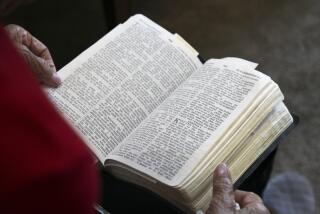Chambers 20th Century Dictionary edited by E. M. Kirkpatrick (Cambridge University: $24.95; 1,583 pp.)
- Share via
Dictionaries are so essential a part of literate life that it is easy to take them for granted, with one elderly and well-thumbed favorite on the desk, neglecting the range and variety available. For years, I have relied mainly on the “Concise Oxford,” nowadays replacing it with the new editions that seem to gain greatly in crispness of definition from their frequent revision. The “Shorter Oxford” is useful mainly as a guide to the “Oxford English Dictionary” itself, which is essential for any serious work, not least for the fascination provided by browsing in its now-completed supplement. Second to the “Concise Oxford,” I usually have placed “Chambers,” a reliable and companionable standby which enjoys a special reputation as the crossword-puzzle and Scrabble addict’s dictionary. “Chambers” used to be revised piecemeal, but the adjustments merely tinkered with the text; however, this new edition--the first to be made available in the United States--is a substantial revision, attractively laid out, which confirms “Chambers’ ” high position among a growing number of commercial rivals.
Under its present title, it goes back to 1901, but its origins lie in the publications of its sponsoring firm, which was prominent in providing so many compilations for Victorian popular education. This partly accounts for an encyclopedic quality that still shows, as well as a definitely Scottish element in its choice of words and its residual puritanism. The primness shows itself in some definitions: pander , for example, is “one who procures for another the means of gratifying his base passions,” and is cross-referenced to pimp , which used to have more or less the same obfuscating information. At last, the editors have brought themselves to add a reference to prostitution under pimp . “Chambers” was the reliably discreet reference book used by girls and teachers in schools like that of Muriel Spark’s “The Prime of Miss Jean Brodie,” but it has at last come out with a range of definitions that it has long been misleading to omit or fudge. Bestiality and buggery , for example, are adequately covered in a volume that had hitherto omitted arsehole . Distasteful though such words must appear to some readers, the editor of a dictionary claiming comprehensiveness is right not to allow misplaced gentility to dictate linguistic exclusions.
“Chambers’ ” range of historic, Scots, and (with unexplained frequency) Spenserian usages gives the dictionary its appeal for Scrabble addicts, who can achieve high scores from rare spellings. Some of the historic words are oddly chosen. This is scarcely the dictionary that one would start with for an explanation of septleva , apparently a stake in basset , an 18th-Century Venetian card game like faro , but there it is, helping to give “Chambers” some of its undeniable browsing charm. Some of the omissions I marked in my older edition have been remedied here, such as habile , heart-attack and standish . The next edition will I hope have Sheffield plate, ringer (double), gully gully man, mizpah , and Babinski reflex , all noted as missing over the years, as well as hack in its computer-piracy sense.
Such examples may seem captious or particularized, but they are the product of a miscellaneous use that over the last few days has needed to know whether from epulation (dining), epulary or epulatory is the correct adjectival form; whether slasher is used aright of a broad spatula for folding documents to a standard width; and to check habile for the dexterous movement of human (as against apes’) thumbs. One never knows what oddities may turn up, and these few examples required several dictionaries to help solve unusual problems.
An English reader becoming appreciatively accustomed to a revised English dictionary is scarcely able to comment on its full usefulness in the United States, though “Chambers” can be recommended at least as a very useful second dictionary on a shelf led by an American English compilation. “U.S.” usages often are distinguished, but “Brit.” specialties are less often pointed out. Varied pronunciations usually are indicated (there is a useful table in the Preface): the English long i in hostile missile makes it sound more like an enemy weapon than hostel missal , presumably a prayer book used in an inn. There are many shibboleths dividing the two sides of the Atlantic in spoken and written English alike, but one is constantly amazed by the extent of linguistic community. The new “Chambers” (now sailing worthily in the United States under the Cambridge flag) can be commended as a valuable addition to the reference shelf of the inquisitive wordsman.
More to Read
Sign up for our Book Club newsletter
Get the latest news, events and more from the Los Angeles Times Book Club, and help us get L.A. reading and talking.
You may occasionally receive promotional content from the Los Angeles Times.










